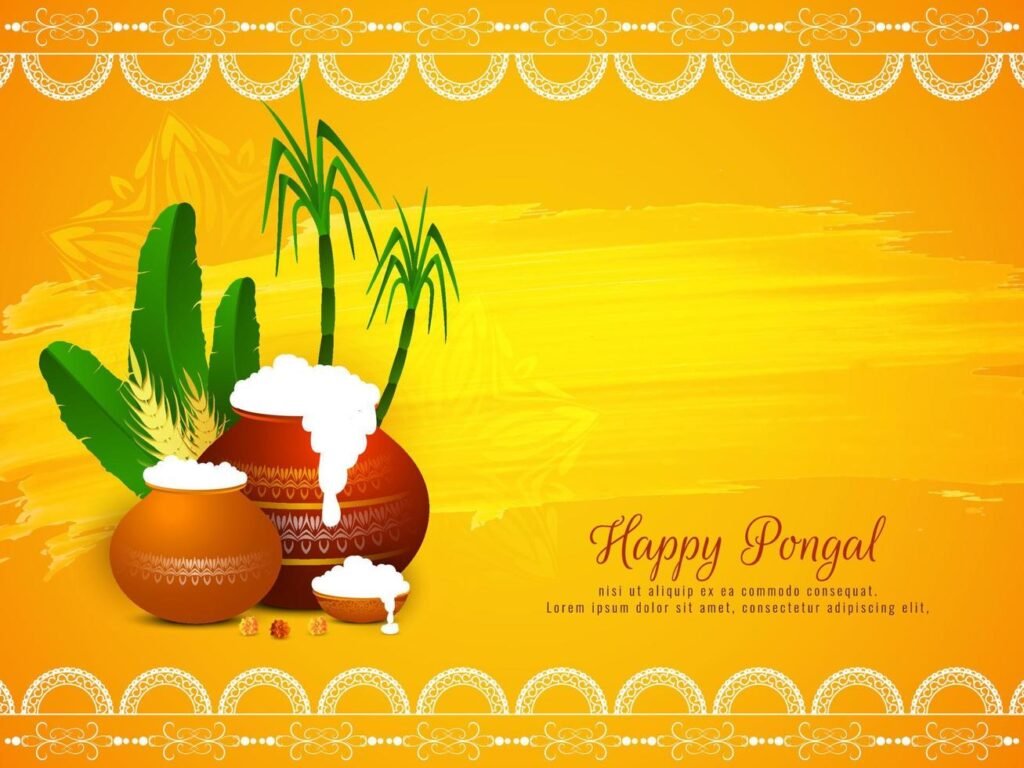Pongal, the vibrant harvest festival of Tamil Nadu, embodies gratitude to nature, the sun god Surya, and farm animals for a bountiful harvest. Rooted in agrarian traditions, this four-day celebration marks the Tamil month Thai (January) and radiates warmth through rituals, feasts, and heartfelt wishes exchanged in lyrical Tamil. Sharing Pongal wishes in Tamil isn’t merely a custom—it’s a bridge connecting generations, reviving linguistic heritage, and invoking divine blessings for prosperity (“Vetri”), health (“Arogya”), and unity. In this article, we explore traditional Tamil Pongal greetings, their deeper meanings, and how these phrases encapsulate the soul of Tamil culture.
1. The Cultural Resonance of Pongal Greetings
Pongal wishes in Tamil transcend mere words; they are poetic invocations of goodwill, deeply interwoven with the festival’s agrarian ethos. Phrases like “Pongalo Pongal!” (பொங்கலோ பொங்கல்!)—shouted as the ceremonial milk-rice dish boils over—symbolize abundance spilling into every home. These greetings echo Tamil Nadu’s reverence for nature, thanking the sun, earth, and cattle for sustaining life. Elders bless younger generations with wishes for wisdom (“Arivu”) and courage (“Thunivu”), while community exchanges reinforce social harmony. Using Tamil, one of the world’s oldest languages, to convey these messages preserves cultural identity and honors ancestors who celebrated Thai as the dawn of hope after the frosty Margazhi month.
2. Traditional Pongal Wishes: Phrases and Meanings
Key Phrases & Interpretations:
-
“இனிய பொங்கல் நல்வாழ்த்துக்கள்!” (Iniya Pongal Nalvazhthukkal!)
Translation: “Sweet Pongal Greetings!”
This phrase radiates universal warmth, wishing joy as sweet as the Sakkarai Pongal dessert. It embodies the festival’s spirit of sharing and sweetness in relationships. -
“புது வயலும் புது வாழ்வும் தரும் பொங்கல் வாழ்த்துக்கள்!” (Pudhu Vayalum Pudhu Vaazhvum Tharum Pongal Vazhthukkal!)
Translation: “May Pongal bless you with new fields and a new life!”
A profound wish for farmers and families alike, linking agricultural prosperity (“Vayal”—fields) to renewed personal growth and opportunities. -
“நெல்லும் பொன்னும் நிறைய வரும்! வீடு வாசலெங்கும் மகிழ்ச்சி மிகும்!” (Nellum Ponnum Niraiya Varum! Veedu Vaasalengum Magizhchi Migum!)
Translation: “May your home overflow with paddy and gold, filling every corner with happiness!”
This verse-style wish merges material abundance (“Paddy & Gold”) with emotional wealth (“Magizhchi”—joy), reflecting Pongal’s dual focus on livelihood and contentment.
3. Modern Adaptations: Blending Tradition with Technology
While Pongal wishes were historically shared through kolam-decorated doorways and communal feasts, today’s Tamils blend tradition with innovation. Social media buzzes with Tamil Pongal GIFs, e-cards adorned with Mattu Pongal cattle motifs, and WhatsApp forwards featuring “Thai Pirandhal Vazhi Pirakkum” (தை பிறந்தால் வழி பிறக்கும்)—a proverb meaning “The birth of Thai paves new paths.” Urban Tamils curate bilingual wishes (Tamil + English) for global friends, while influencers create reels explaining phrases like “Kaanum Pongal” (the fourth day’s farewell). Yet, even digital messages retain core values: thanking nature (“Uzhavar Thirunaal”—Farmer’s Festival) and praying for rain-fed prosperity (“Mazhai Perungal”).
4. Crafting Heartfelt Pongal Wishes: Tips and Etiquette
Authenticity Matters: Use pure Tamil words like “Inbu” (இன்பு—delight) or “Elumbugal” (ஏலும்புகள்—resources) instead of loanwords. For elders, add respectful suffixes like “Ayya”/”Amma”.
Contextual Nuances:
-
Day 1 (Bhogi): Focus on renewal—e.g., “Pazhaiyana Kizhithalum, Puthiyana Puguthalum!” (பழையன கழிதலும், புதியன புகுதலும்!)—”Discard the old, embrace the new!”
-
Day 2 (Surya Pongal): Highlight gratitude to the sun—e.g., “Surya Devarkku Nandri!” (சூரிய தேவர்க்கு நன்றி!).
-
Day 3 (Mattu Pongal): Honor cattle—e.g., “Naadu Kalaigaluku Pongal Vazhthukkal!” (நாட்டு கால்நடைகளுக்கு பொங்கல் வாழ்த்துக்கள்!).
End wishes with “Pongalo Pongal!” for rhythmic exuberance.
FAQ Section
Q1: Can non-Tamils use Tamil Pongal wishes?
Absolutely! Tamils appreciate the effort. Start with simple phrases like “Iniya Pongal Nalvazhthukkal” and add a translation.
Q2: How to pronounce complex Tamil wishes correctly?
Use tools like Google Translate’s audio feature or Tamil language apps (e.g., “Learn Tamil Quickly”). Key sounds:
-
“Zh” (like in “Magizhchi”) = soft “L” + “R” blend.
-
“Nalvazhthukkal” = Nuhl-vuh-zh-thook-kal.
Q3: Are there Pongal wishes for business settings?
Yes! Formal wishes blend prosperity and ethics:
“நல்ல ஈட்டமும், நாணய வாழ்வும் தரும் பொங்கல்!”
(Nalla Eettamum, Naṇaya Vaazhvum Tharum Pongal!)
“May Pongal bring righteous wealth and honest living!”
Q4: What’s a wish for long-distance family?
“தூரத்தில் இருந்தாலும், உங்கள் வீட்டில் பொங்கல் மணம் நிறையட்டும்!”
(Thoorathil Irundhalum, Ungal Veetil Pongal Manam Niraiyattum!)
“Though miles apart, may your home overflow with Pongal’s fragrance!”
Conclusion: More Than Words—A Cultural Embrace
Pongal wishes in Tamil are linguistic heirlooms, carrying centuries of gratitude, hope, and unity. From the exuberant “Pongalo Pongal!” echoing in village fields to stylized Instagram captions in Chennai, these phrases bind Tamils worldwide to their roots. As globalization challenges cultural preservation, speaking Pongal greetings in Tamil becomes an act of resilience—a reminder that prosperity isn’t just harvested from fields, but from the richness of shared heritage. This Thai, let your wishes sow seeds of joy: “பொங்கல் திருநாளில் உங்கள் வாழ்வு பொற் கொல்லனாகட்டும்!” (May your life shine like a goldsmith this Pongal!).


